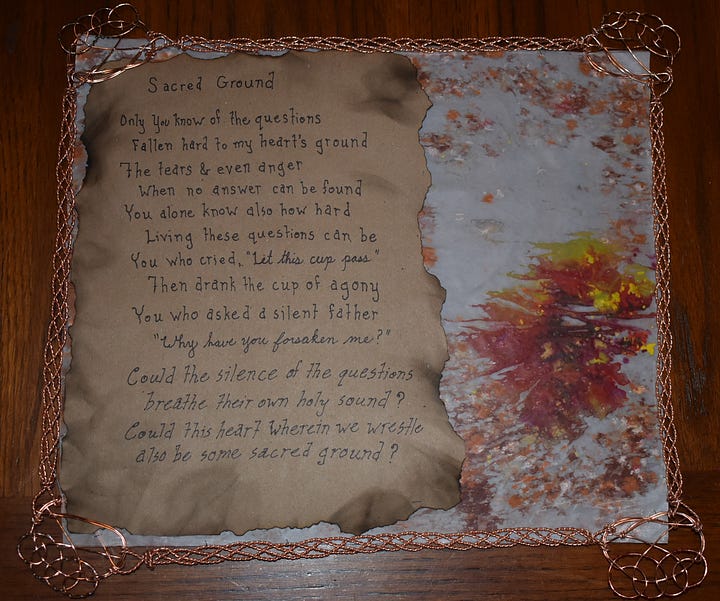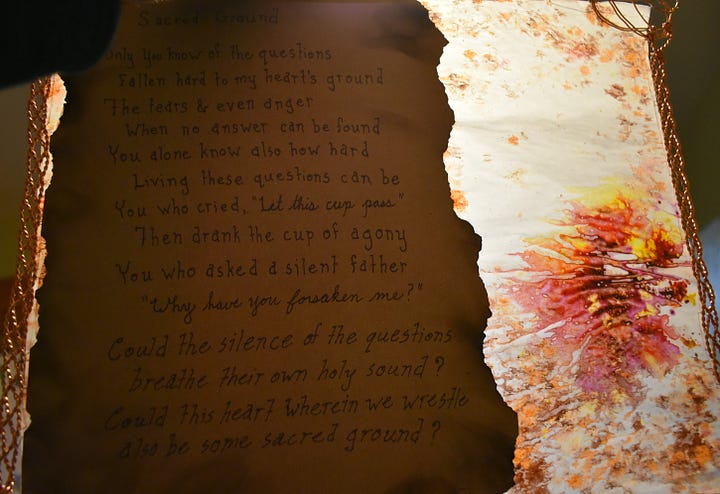Welcome to a new season and a new weekly newsletter: a curation of other Substackers (and sometimes other sources—books, art, songs, etc.) on a central theme.
This weeks’ theme? Lament.
“Lament is the path that takes us to the place where we discover that there is no complete answer to pain and suffering, only presence.” – Michael Card
An Introduction to Lament
Now, in starting this series on a topic like lament, I realize it can go over like a lead balloon. Who actively looks for something to lament about?
You might not even be all that familiar with the term, besides that it has something to do with sadness and sounds a little biblical.
Yes, and yes.
Lament is something none of us necessarily go looking for—even people who are drawn toward the bittersweet, which Susan Cain wrote about in her terrific and somewhat related book Bittersweet: How Sorrow and Longing Make Us Whole.
But the thing about lament is this:
There's going to be a time in life when we'll need it and if we don't know what lament is and don't know where to look, we’re never going to find it when we have that need.
Before highlighting posts from other Substackers, I want to mention my personal interest in the topic.
I sought out a book about lament a couple of years ago, titled A Sacred Sorrow. This book by Michael Card is about recovering what he calls “the lost language of lament.” He draws attention to the idea that in the church, there is a gap in this area.
There is an unspoken (or sometimes, spoken) expectation to always show your shiny, happy side. The problem with this approach to faith is that we all have times of grief, and we need the freedom to express this.
We also need to have a language with which to speak our sorrow; that language is lament.
“None of us need to be taught how to lament.
What we need to hear is that we can lament ...” – Michael Card
I read the book around my 40th birthday (and not because I was lamenting turning 40). Earlier that year, I had gone through a rough season with one of my children. I've written about this before; he was struggling with depression, anxiety, and circular thoughts as a lingering effect of Covid.
For a few months, he wasn't able to focus on much of anything; sometimes all he was able to do was verbalize that he was scared or sad; other times, we had long and difficult conversations about the exact nature of his anxiety (and they weren't easy topics).
I felt the need to connect with the parts of my faith that spoke to the struggle we were facing.
I needed to know it was okay to stand (or sometimes fall) in this place of tension between faith and doubt, a place where questions and wrestling with God is okay.
That is a large part of what lament is.
But why start this Creative Curations series on the theme of lament?
Here’s the simple reason: two people I subscribe to posted about lament within two days of each other. It's not like I follow thousands of Substacks, so I latched onto that, and this post is the result.
Lament, Fear, and Faith
Chris Morris shared this post: Lament Is a Powerful Antidote for Fear. Not long ago, I posted a review of Chris’ recent book Resilient and Redeemed: Lessons about Suicidality and Depression from the Psych Ward. Chris writes about the intersection of faith and mental health for the church.
He’s got another book publishing this week, Trekking Toward Tenacity: Your Family’s Roadmap to Stronger Mental Health, which focuses on mental health for families—a terrific resource!
In his recent post about lament, Chris writes, “There is a dearth of understanding of why lament is a powerful part of our faith and what laments accomplish in our journey with God,” contending that “American Christianity pushes people to try to stay in a place of happiness or contentedness in our walk with God, even when trials overwhelm us and we need an outlet.”
His post is worth reading in its entirety, especially if you or someone you know is struggling through a dark season and needs a language with which to express this struggle.
“Only someone who is fully awake and engaged in life can lament. Lament only comes from the lips of those who know the hunger and thirst, the true terrain of the wilderness …” – Michael Card
Grief & Lament
Alastair Sterne and his wife Julia write a newsletter and podcast titled Ordinary Matters. Julia has worked in the mental health space for over a decade while Alastair is a pastor and author.
A while ago, they posted this conversation on grief and lament. They discuss the stages of grief and the dual model of grief, as well as practices of lament as a way of dealing with grief—simple ways to connect with and accept, welcome, and process grief.
This post is from 2021, so you’ll notice their discussion is in relation to the era of Covid-19, yet they offer some very helpful practices. One interesting thing they talk about is crying and that sometimes people need to creating a safe space to cry.
That was really interesting for me, as it reminded me of a children’s book I read as an adult that gave me the “permission” to grieve a friend’s death from years before. (Sometimes you do need something to help you enter into grief, but this is a bigger topic for another time.)
The post also has some great illustrations by an artist friend of theirs on the five practices of lament that Julia and Alastair discuss. (I don’t want to give away the five practices they share, but you should check out the post and their Substack.)
Also, Alastair is publishing a book next month titled Longing for Joy, and he’s looking for folks to join the book’s launch team.
Mixed Emotions
Another writer on Substack, author and counselor Gay B Brown, explores the idea of mixed emotions when it comes to lament, as part of a series she is doing on the theme of lament.
I appreciate her post about mixed emotions and holding them in tension as part of the complex and nuanced people that we are.
She observes, “If what we love and care about shapes how we feel, then we will live constantly with mixed emotions. This is a right response, to hold in tension what appears at face value to be conflicting emotions.”
In the post, she offers an interesting metaphor about mixed emotions and colors. It’s a helpful read for anyone sifting through emotions and not quite sure how to sit with all of them at the same time.
Poetry & Lament
Charissa Sylvia is the other writer whose piece on lament showed up in my inbox last week. Her post is a poem titled A Language of Lament. Two great lines read:
“What are my poems these days
if not part dirge and all prayer?”
A couple of years ago, I did a collaboration with an artist on a creative project. She crafted a gorgeous frame. It was my task to “fill” it with something.
I had been working on a poem that is sort of a lament, which I chose for this project.
I’m not artistic enough to sketch or paint, but I needed to do more than just write out the poem. It felt too plain for such a lovely frame. So, I played around a bit with crayon shavings—melting them into an image to accompany the poem.
I’m sharing it here, and I hope this and the other posts and resources linked here serve as an invitation for you to explore the theme of lament further in your life and in your writing.


“Jeremiah wept and God saw. He cried and God heard. He is not the God who waves the magic wand and makes the Babylonians or the cancer go away. He's the God who sees and hears and enters into the suffering with his suffering people in the wilderness.” – Michael Card, A Sacred Sorrow
Thanks for reading! I’d love to know if you have written anything on the topic of lament or grief. Or if there are any books or Substacks you’ve read that have helped inform or guide you in this topic.





I’m just now seeing this. Such a beautiful reflection, thank you for the honor of being included 🥹. I’ve needed so many words of lament these days.
“Jeremiah wept and God saw. He cried and God heard. He is not the God who waves the magic wand and makes the Babylonians or the cancer go away. He's the God who sees and hears and enters into the suffering with his suffering people in the wilderness.” – Michael Card, A Sacred Sorrow
Amen
The God who sees is with us in our lamentations and does not leave us without hope.
“Because of the LORD’s great love we are not consumed, for his compassions never fail. They are new every morning; great is your faithfulness. I say to myself, ‘The LORD is my portion; therefore I will wait for him.’ The LORD is good to those whose hope is in him, to the one who seeks him; it is good to wait quietly for the salvation of the LORD” Lamentations 3:22-26 NIV.
Fitting thoughts that complement my own writings today.
Thank you